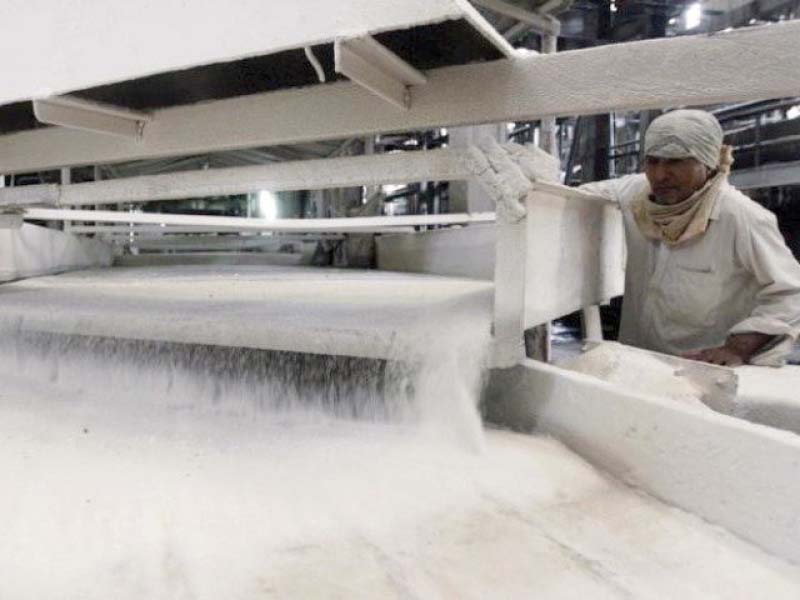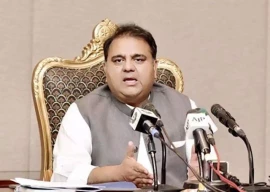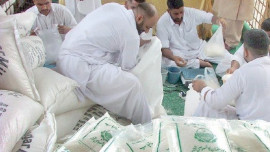
The federal cabinet mulled on Tuesday over the Sugar Sector Reforms Committee report and decided that a “public debate” would be held for three weeks for taking input from different stakeholders on the sugar sector reforms.
Regarding the cultivation and purchase of the sugarcane crop, the Ministry of Industries and Production’s report has recommended that sugarcane prices should be determined by market forces and suggested the abolition of indicative price.
The report also recommended that the “government would no longer regulate the indicative sugarcane prices and ex-factory sugar prices would be deregulated with effect from crushing season 2023”.
To abolish the clause dealing with indicative price, it recommended amendment to the Sugar Factories Control Act, 1950. However, the proposed that two to three years’ time should be given to the farmers to make adjustments.
According to the report, pricing of sugarcane should be determined in accordance with sucrose content.
Also read: ‘No sugar shortage in country’
It added that the provincial government should provide the latest equipment and laboratories to the cane commissioners for testing the sucrose content and implementing the new pricing mechanism.
Also, it suggested that “there should be no zoning of crops and the government needs to provide incentives” on the crops which were earners of foreign exchange, such as cotton.
Suggesting the required action, it stated that abolition of legislation, if there was any, by provincial governments regarding zoning of crops and leaving the choice of what to grow to the farmers or market forces. It, however, stated that at present there were no laws in Pakistan on zoning of the crops.
The third recommendation stated that there should be adequate pricing of water on volumetric basis to avert market failures. The step will remove externalities and lead to incorporation of actual cost of production of sugarcane, it said.
It suggested that legislation by provincial agriculture and irrigation departments on the supply of water to the cropping areas.
The report, while suggesting the abolition of the Sugar Factories Establishment and Enlargement Act, 1966, by the provinces, further recommended that there should be free choice of area for crop cultivation for farmers as well as for the private sector for setting up sugar mills.
The report suggested to the government to invest in efforts to improve seed technology and study beet sugar cultivation; provision of low-cost financing for farmers for purchase of inputs; and improvement in forecast and provision of accurate data of sugarcane crop.
Also read: Local stores receive over 100,000 bags of sugar
For the data, it said, the Space and Upper Atmosphere Research Commission (Suparco) and the provincial crop reporting departments needed to collaborate and employ modern techniques to report accurate data about sugarcane crop production to the federal government.
Recommending a cost and benefit analysis of cultivation of different crops, the report said that a study was required to review relative importance of crops for Pakistan viz-a-viz area under cultivation to enable the government to devise required interventions.
During the last three years, it said, the federal and provincial governments had done considerable work under the CPEC umbrella for mapping agriculture zones in the country, adding that the governments of Punjab, Khyber Pakhtunkhwa and Balochistan had developed their ecological zones.
On the crushing of sugarcane and manufacturing of sugar, the report recommended avoidance of late crushing by asking provinces to make amendments to the Sugar Factories Control Act 1950 and enable provincial governments to fix crushing date. In this regard, it pointed out that ideal legislation was of Sindh).
Suggesting enhancement of financial penalties for late crushing in the act, it said that “these penalties may include Rs5 million fine and 12 months imprisonment.”
On the storage and sales by sugar mills, intervention in the Adequate Enforcement of Registration of Godowns Act was recommended so that strict implementation by the provincial governments was ensured that no hoarding was possible.
Also read: Sugar prices stay stable: NPMC told
On curbing mismanagement of pledged stocks by the mill owners, the report recommended that the State Bank of Pakistan (SBP) should issue an advisory to the commercial banks to inspect their pledged sugar stocks, and verify their presence with the collaboration of the FBR and the cane commissioners.
It maintained that joint inspection teams of stakeholders, including the bank concerned might be constituted to verify the pledged stock after every three months. In case any misappropriation and shortage came to notice, it read, the matter might be referred to the Federal Investigation Agency (FIA) for criminal action against defaulter.
In order to stop tax evasion, benami sales, undocumented transactions and other malpractices prevalent in the sugar industry, the report suggested to the FBR to implement IT-based Track and Trace system, make registration of brokers, sugar dealers, and wholesalers mandatory with NTN & STRN linked to their bank accounts along with mandatory registration of godowns and automated online inventory management system.
For reporting of accurate data of sugar to the federal government, it said, the FBR should develop a digital dashboard of stocks, wherein stocks data of the provinces and the cane commissioners might also be shared with Ministry of Industries and Production on regular basis.
To avoid speculation (Satta), it recommended that mills provided the forward contract reports on a daily basis; specifying the quantity of sugar; its booking price and that the maximum lifting time should be 15 days.
Also read: FIA director issued show-cause in sugar scam case
It further recommended that the inspection regime should be strengthened to ensure that no sugar remains un-lifted after the expiry of the forward contract; new legislation be introduced to deal specifically with Satta, whether physical or online, on sugar and other commodities. The forward contracts should not be hidden and not ‘parchi-based’ either, it added.
Recommendations on wholesale and retail contain amendments in the Section 250(2) of the Companies Act, 2017 by the SECP, the report pointed out. It said that the finance division should amend the Competition Act of 2010.
Keeping in view that the associations were generally the frontrunners of the cartels, it said, Section 38 of the Competition Act may be amended suitably by adding “a maximum penalty of Rs75 million for violations by the associations.” Leniency for insiders, who were ready to be whistle-blowers might be incentivised for this purpose. It proposed sales tax on the actual cost of production of sugar.
On exports and imports of sugar, it said, imports of sugar would remain open and exports would be considered only if there was an amount of 1.5 MT in excess of the domestic consumption requirement. “Government will not provide any export subsidy,” it read.
For limiting demand, it has finally recommended involving media to convey that sugar consumption led to diseases and poor health like obesity, diabetics, cardiovascular disease and hence there was need to raise public awareness in this regard so that “our society reduces consumption of sugar”.
The Ministry of Industries and Production’s report came after the Sugar Advisory Board (SAB) took serious notice of sugar price hike in November 2019. On the recommendations of the SAB, the government of Punjab fixed the prices of sugar in November 2019.
Also read: Unstoppable sugar prices
Later in January 2020, the SAB felt that there was a real shortage of sugar, which was also exerting pressure on the prices. Resultantly, on its recommendations in February 2020, the government not only banned the export of sugar, but also allowed its import.
Furthermore, it said, on the directions of the prime minister, the Sugar Inquiry Committee was formed under the FIA in February 2020, which was later converted into an Inquiry Commission under the DG FIA in July 2020. It said that the inquiry commission suggested a comprehensive policy intervention in the sugar sector.
Pakistan has a total of 90 sugar mills with 45, 38 and 7 in Punjab, Sindh and Khyber Pakhtunkhwa (K-P) respectively. In 2020-21, the report stated, only 78 sugar mills were functional -- 40 in Punjab, 32 in Sindh and 6 in K-P.
The total crushing capacity of these mills was about 800,000 tons per day, according to the report.
However, it added that the actual capacity utilised by the mills was dependent on sugarcane production in any season.

1732243059-0/mac-miller-(2)1732243059-0-165x106.webp)

1672385156-0/Andrew-Tate-(1)1672385156-0-165x106.webp)
1732240377-0/mac-miller-(1)1732240377-0-165x106.webp)



1732240636-0/WhatsApp-Image-2024-11-21-at-19-54-13-(1)1732240636-0-270x192.webp)











COMMENTS
Comments are moderated and generally will be posted if they are on-topic and not abusive.
For more information, please see our Comments FAQ